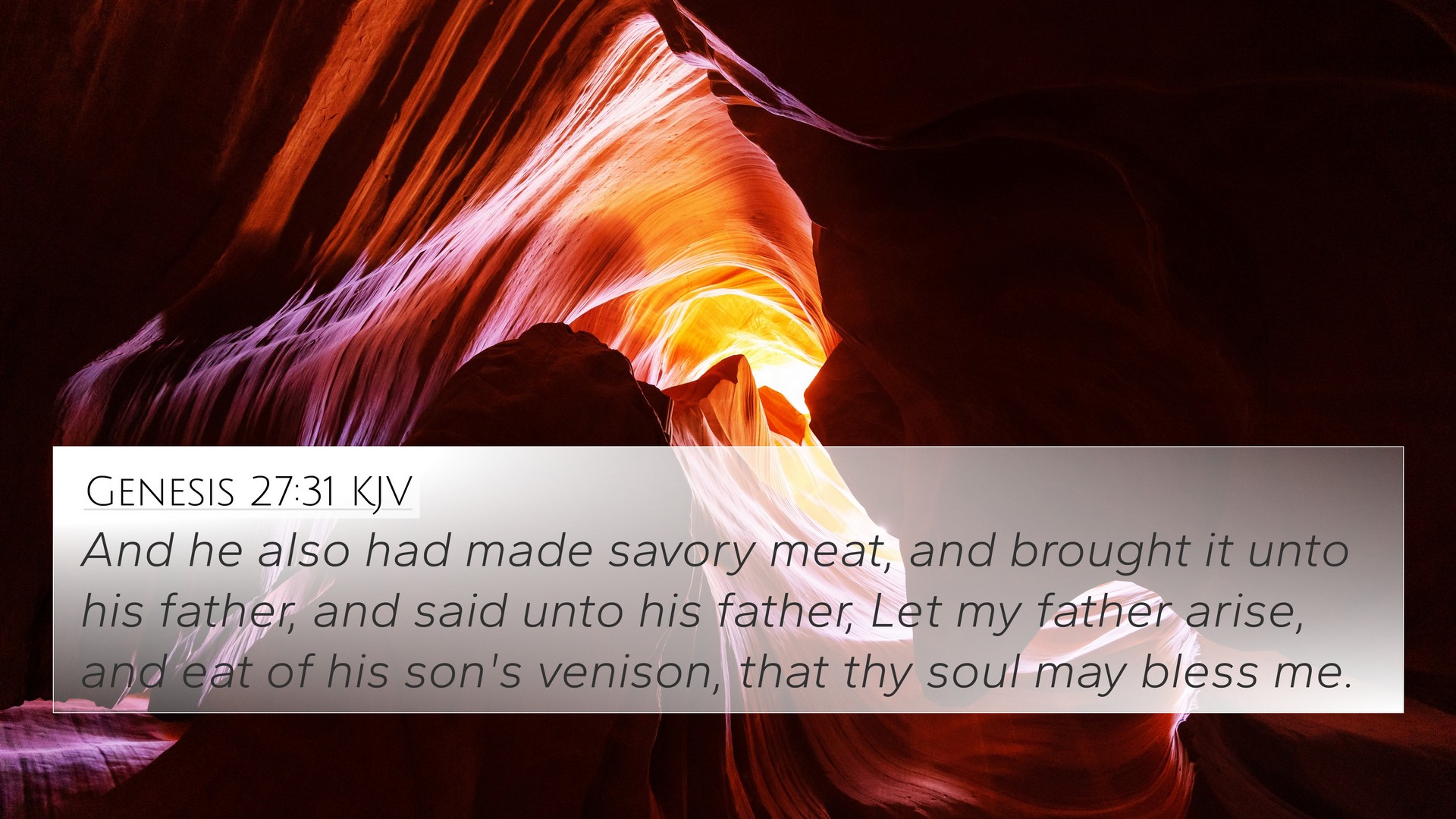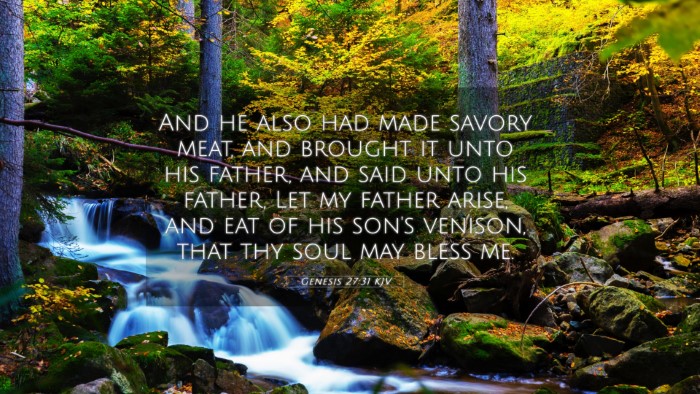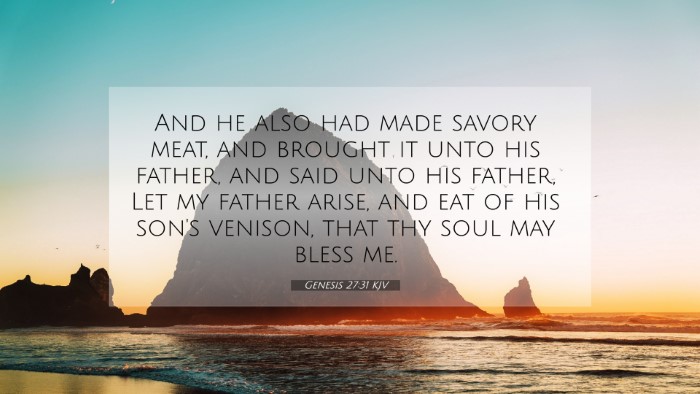Understanding Genesis 27:31
In Genesis 27:31, we observe the poignant moment when Esau, after learning about the deceit involving his brother Jacob, expresses deep sorrow. The verse reads: "And he also had made savory meat, and brought it unto his father; and said unto his father, Let my father arise, and eat of his son’s venison, that thy soul may bless me."
Contextual Background
To fully grasp the meaning of this verse, it is essential to consider the broader narrative within Genesis. This passage illustrates the consequences of familial deceit and the struggle for blessing within the family unit.
Interpretation and Commentary Insights
The commentaries by Matthew Henry, Albert Barnes, and Adam Clarke provide valuable insights into this complex verse.
Matthew Henry's Commentary
Matthew Henry elucidates that this moment is critical in understanding the dynamics of the Esau and Jacob narrative. Esau, despite his character being often portrayed in a negative light, shows his longing for paternal approval through the act of providing a meal. Henry emphasizes the need for blessing in the ancient Near Eastern context.
Albert Barnes' Commentary
Albert Barnes interprets this verse as showcasing the desperation of Esau. His desire for his father’s blessing reflects not just a physical need, but a deeper spiritual longing. Barnes notes that the blessings bestowed by the father carry great weight and significance in Jewish tradition, thus making Esau's loss even more poignant.
Adam Clarke's Commentary
Adam Clarke further elaborates on the social customs surrounding blessings and meal preparation in this cultural setting. Clarke posits that Esau's actions were not just about fulfilling a ritual, but were laden with emotional resonance—he seeks not only a meal but his father's love and recognition.
Thematic Connections and Cross-References
This verse connects with several other biblical passages, which helps illuminate its significance:
- Hebrews 12:16-17: Discusses Esau's loss of his inheritance and his difficult repentance.
- Genesis 25:29-34: Relates to Esau selling his birthright to Jacob.
- Genesis 27:18-29: Details Jacob’s deception to receive Isaac’s blessing.
- Malachi 1:2-3: Highlights God's love for Jacob and hatred for Esau, reinforcing the theme of chosen blessing.
- Genesis 32:6: Shows Esau’s later interaction with Jacob, illustrating reconciliation.
- Romans 9:13: Quotes Malachi to discuss God's sovereignty in choosing Jacob over Esau.
- Numbers 20:14-21: Mentions Edomites, descendants of Esau, to reflect on their historical relationship with Israel.
- Deuteronomy 21:15-17: Provides regulations concerning inheritance that relate to the significance of blessing.
- James 1:17: Speaks to the nature of good gifts coming from God, paralleling the theme of blessings.
- Psalm 107:9: Describes God’s provision, emphasizing a spiritual interpretation of hungering for God’s blessing.
Understanding Deception and Consequences
This narrative invites reflection on themes of deception, the quest for parental approval, and the dire consequences of one's actions. The family dynamics portrayed serve as a reminder of the lengths to which individuals may go to obtain affirmation and status within their lineage.
Inter-Biblical Dialogue
Genesis 27:31 not only emphasizes personal relationships but also shows the larger theological implications of familial relationships in the context of God's covenantal promises. The cross-references provide a rich tapestry of connections that enhance understanding of the Bible's overarching themes.
Applying Insights to Personal Life
As we reflect on Genesis 27:31 and its interpretations, it prompts us to consider our own familial relationships and the ways in which we seek approval and blessings from our loved ones. It challenges us to think about integrity in our actions and the impact of deceit on our relationships.
Cross-Referencing in Biblical Studies
For those interested in deeper study, utilizing tools for Bible cross-referencing can provide clarity and richness to one's understanding of scriptures. A Bible concordance or cross-reference Bible study guide can assist in making thematic connections that illuminate the significance of each passage.
Final Reflections
In conclusion, Genesis 27:31 opens a profound dialogue not only about Esau's immediate plight but also about broader spiritual and ethical themes. Through comparative Bible verse analysis, one can gain greater insight into the nature of divine blessing and human relationships.
Further Study Suggestions
Those seeking to delve deeper might explore:
- How to find cross-references in the Bible.
- Identifying connections between the Old and New Testament.
- Thematic Bible verse connections related to family dynamics.
- Comparative study of Pauline epistles concerning inheritance and blessings.



